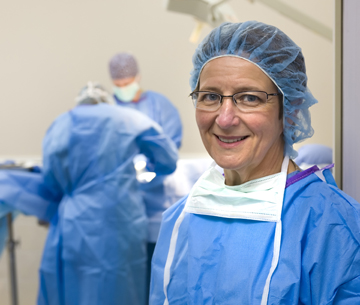Purdue Profiles: Lyn Freeman

Lyn Freeman, associate professor of veterinary clinical sciences and biomedical engineering. (Purdue University photo/Mark Simons)
Working closely with Lafayette's Almost Home Humane Society, Lyn Freeman, associate professor of veterinary clinical sciences and biomedical engineering, has seen firsthand the plight of the animals being sheltered there. When the time comes for another dog to join Freeman's golden retriever, Romeo, and her Labrador retriever, Sweet Pea, she knows she will adopt from the humane society just as some of her students have.
"When our fourth-year veterinary students are working at the humane society as part of their surgical rotation, they're exposed in a much more real way to homeless animals than when they study about them in class," says Freeman, a board-certified veterinary surgeon at Purdue's School of Veterinary Medicine. "Many of the students are realizing how important it is to volunteer and adopt from animal shelters."
How did you become interested in animals?
I remember when I was 9 or 10, my family was raising animals for 4-H projects at our home in a rural part of Oklahoma. One day in the spring, the agriculture teacher came to our house to shear the sheep. While he was shearing, the sheep's skin got caught between the clippers and tore. The teacher sent my mom in the house to get a needle and thread, and he sewed it up right there in our backyard.
That was the coolest thing I had ever seen, and from that point on I wanted to study veterinary medicine. That was that. From an early age, I never went off course from that goal.
How does biomedical engineering fit into your focus on veterinary science?
After teaching for a while, I decided I wanted to experience industry and began working for Ethicon Endo-Surgery testing medical products that were going to be used in people. Later I worked with the engineers there to develop products and procedures. I always really enjoyed working with engineers, so when Purdue offered to have part of my appointment be in veterinary medicine and part in biomedical engineering, it was a great match. Now I get to help develop products biomedical engineers have invented.
What is your favorite part of your job?
My favorite part is teaching the students surgery one-on-one. Of course I enjoy students at every stage of their education, but probably my favorite are those students who are in the surgery room for the first time. They are usually really nervous, worried and anxious. I like being a support for them. Intellectually they know exactly what to do; they just need encouragement and confidence to actually do it.
How did the service learning project with the Almost Home Humane Society come about?
The veterinary surgery department in the School of Veterinary Medicine has always worked with the humane society to do spays and neuters, but the way we used to do it with the animals coming to campus for their surgeries presented a lot of issues.
A few years ago, the humane society approached us saying a donor gave some money and that they wanted to renovate a vacant space at the humane society into a surgical room, but that they wouldn't have the means to buy equipment. Over that summer we transported equipment from our school to the humane society for a trial run. The summer went very well, and as part of that, donors came forward, contributing enough money to buy all the necessary equipment. The animal pharmaceutical company, Merial, gave the school a grant to purchase all the necessary disposable items, and Ethicon provides a lot of our sutures.
Now we do nearly all the surgeries at the humane society. So far, we've had about 200 surgery and anesthesia students involved, performing more than 400 spays and neuters. It's a really good thing. The animals are less stressed, the humane society is saving money and our students are getting invaluable experience.
That sounds like a great opportunity all around. Are there any plans for the future of this project?
I don't know if it's going to happen or not, but my dream is to have a motor home or trailer that is a fully equipped surgical suite, with a dedicated full-time faculty member. Students would have the opportunity to participate in an elective three-week rotation during their senior year of veterinary school. The students and this faculty member would travel to a humane society in the area, perform surgeries, recover the animals, clean the equipment and travel to another site the next day.
I've talked with some humane societies in the area and everybody is very welcoming of this idea. We would be able to help 10 to 15 sites instead of one.
What is your most memorable moment since being at Purdue?
One day on our way back from the humane society, I asked the students, "What’s been the best day of your veterinary career so far?" They said, "Today." For me that was a great payback because I know that what I'm working so hard at actually means something.
